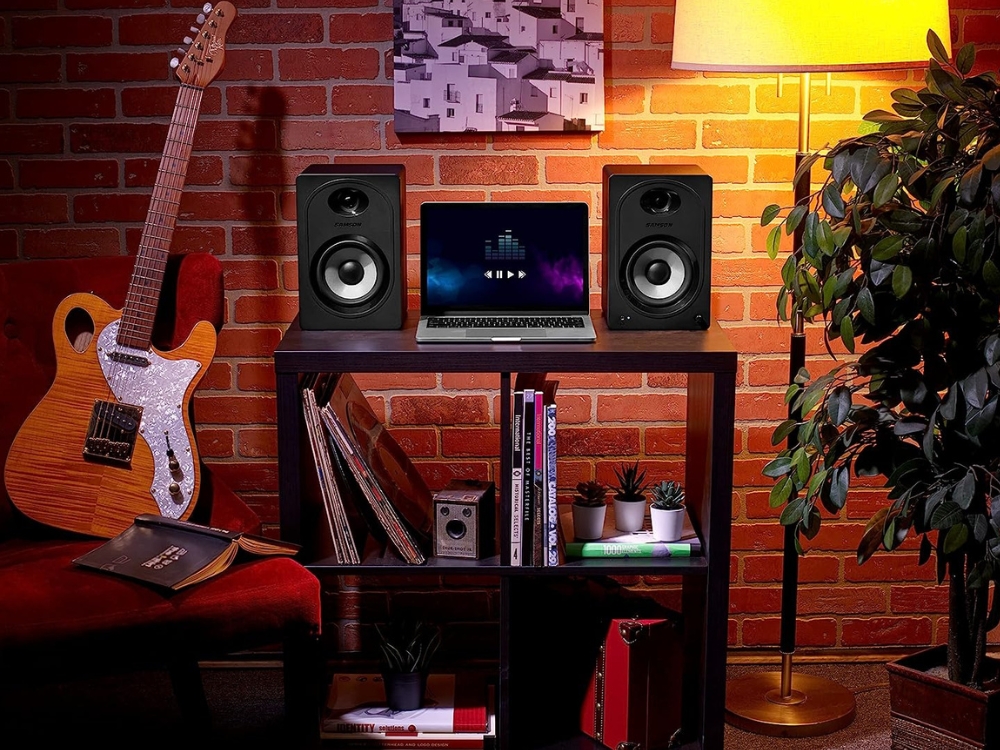Affiliate Disclaimer
As an Amazon Associate, we earn from qualifying purchases.
Studio monitors, also known as reference monitors, are specially designed speakers that offer accurate and precise audio reproduction. They are primarily used in recording studios, where sound engineers rely on their transparent and unbiased sound to make critical mixing decisions. While studio monitors are designed with professional audio production in mind, they can also be an excellent choice for music enthusiasts who seek a more faithful representation of their favorite songs.
Table of Contents
ToggleThe Essence of Studio Monitors
Studio monitors are built to provide an uncolored and unbiased representation of audio signals. Unlike consumer-grade speakers that often enhance certain frequencies to make the music sound more appealing, studio monitors aim for accuracy and transparency. They are engineered to reproduce audio signals with minimal distortion, allowing listeners to hear the music exactly as it was intended by the artist or producer.
Benefits of Studio Monitors for Music Playback
Using studio monitors for music playback offers several significant advantages over conventional speakers. Let’s explore some of these benefits in more detail:
Accurate Sound Reproduction
Studio monitors excel at delivering accurate sound reproduction, thanks to their flat frequency response. This means that they reproduce audio signals without artificially boosting or attenuating specific frequency ranges. As a result, you can hear the music as it was recorded, with all its nuances and subtleties intact. Whether you’re listening to classical, jazz, rock, or any other genre, studio monitors ensure a faithful representation of the original recording.
Precise Stereo Imaging
Stereo imaging refers to the ability of speakers to recreate a realistic soundstage where individual instruments and sounds are properly positioned. Studio monitors are renowned for their precise stereo imaging capabilities, allowing listeners to experience a more immersive and lifelike soundstage. With accurate imaging, you can close your eyes and feel as if you’re sitting in the middle of the recording studio, surrounded by musicians.
Detailed Resolution
Studio monitors are designed to reveal even the smallest details in a recording. They offer an exceptional resolution, allowing you to hear subtle nuances, intricate instrumentations, and delicate vocal performances that might be missed on conventional speakers. This level of detail enhances the listening experience, making it more engaging and rewarding, especially for audiophiles and music enthusiasts who appreciate the intricacies of well-produced music.
Neutral Sound Signature
The neutral sound signature of studio monitors makes them versatile for different music genres and audio content. Unlike speakers that enhance bass or treble frequencies to create a more pronounced effect, studio monitors reproduce the sound faithfully without any coloration. This neutrality allows you to experience the music as the artist intended, regardless of the genre or production style. Whether you’re into heavy metal, hip-hop, classical, or electronic music, studio monitors can handle it all with precision and accuracy.
Critical Listening Experience
Studio monitors are designed to be tools for critical listening. They allow audio professionals to make accurate judgments during the recording, mixing, and mastering processes. By using the same reference monitors that professionals rely on, music enthusiasts can have a similar critical listening experience. Studio monitors help reveal any imperfections in the music, such as mixing flaws or artifacts, which can be both educational and enjoyable for those who want to delve deeper into the intricacies of audio production.
Expandability and Customization
Another advantage of studio monitors is the ability to expand and customize your audio setup. Many studio monitors offer a range of inputs and outputs, allowing you to connect them to various audio sources, such as computers, audio interfaces, or even turntables. Additionally, some studio monitors come with adjustable settings and calibration options, enabling you to fine-tune the sound to your liking and optimize them for your listening environment.
Potential Drawbacks of Studio Monitors for Music Listening
Unforgiving Nature: Studio monitors are designed to expose flaws in audio recordings and mixes, which might be less noticeable on consumer speakers. If a song or album has poor production quality or lacks proper mastering, it may sound less enjoyable or even disappointing when played through studio monitors.
Large Size and Price: Studio monitors tend to be larger and more expensive compared to consumer speakers. They are optimized for professional use in acoustically treated environments, which might not be practical or necessary for casual music listening in most home setups.
Additional Equipment Requirements: To fully benefit from studio monitors, you might need to invest in additional equipment, such as an audio interface or a dedicated amplifier. These additional costs can make studio monitors a less attractive option for casual listeners who seek simplicity and convenience.
Factors to Consider When Using Studio Monitors
When deciding whether studio monitors are suitable for your music-listening needs, consider the following factors:
Listening Environment: Studio monitors perform best in acoustically treated rooms, where sound reflections and resonances are minimized. If your listening space is untreated or has poor acoustics, the benefits of studio monitors might be compromised.
Personal Preferences: Everyone has unique preferences when it comes to audio reproduction. Some listeners might prefer a more colored or enhanced sound, while others appreciate the accuracy and neutrality of studio monitors. Consider your own preferences and the type of music you enjoy before making a decision.
Tips for Optimizing Studio Monitor Experience
If you decide to use studio monitors for casual music listening, here are some tips to optimize your experience:
Room Acoustics: Improve the acoustics of your listening room by adding sound-absorbing panels, diffusers, or bass traps. This helps minimize unwanted reflections and resonances, allowing your studio monitors to perform at their best.
Placement: Position your studio monitors correctly for optimal sound reproduction. Follow the manufacturer’s recommendations regarding speaker placement and consider using isolation pads or speaker stands to reduce vibrations and improve clarity.
Volume Control: Be mindful of the volume levels when using studio monitors. Excessive volume can lead to listener fatigue and potentially damage your hearing. Maintain a comfortable listening level to enjoy music without compromising your long-term auditory health.
FAQs about Studio Monitors for Music Listening
Let’s address some frequently asked questions about using studio monitors for music listening:
1. Are studio monitors better than regular speakers for music listening?
Studio monitors and regular speakers cater to different needs. Studio monitors excel in accuracy and transparency, while regular speakers often enhance certain frequencies for a more pleasing listening experience. The choice depends on individual preferences.
2. Can I use studio monitors in a regular living room?
Yes, you can use studio monitors in a regular living room. However, keep in mind that they might not perform optimally without proper acoustic treatment. Consider room dimensions, reflections, and resonances when setting up your studio monitors.
3. Do studio monitors require a separate amplifier?
It depends on the model of studio monitors you choose. Some studio monitors have built-in amplifiers, while others require a separate amplifier or audio interface for optimal performance. Check the specifications of the specific model you are interested in.
4. Can studio monitors be used with mobile devices or laptops?
Yes, studio monitors can be used with mobile devices or laptops, but you may need additional equipment such as a digital-to-analog converter (DAC) or audio interface to connect them properly. Studio monitors typically have balanced XLR or TRS inputs, so you may need adapters or cables to connect them to the headphone or line outputs of your mobile devices or laptops.
5. Are studio monitors suitable for all genres of music?
Yes, studio monitors are suitable for all genres of music. Their accurate and neutral sound reproduction allows you to hear the music as it was intended to be heard by the artists and producers. Whether you enjoy classical, rock, hip-hop, or any other genre, studio monitors can provide an immersive and detailed listening experience.
Conclusion
In conclusion, studio monitors can be a great choice for listening to music, offering accuracy, clarity, and a balanced sound representation. They allow you to appreciate the intricate details and nuances in the audio, providing an immersive and authentic listening experience. However, it’s important to consider factors such as your listening environment, personal preferences, and additional equipment requirements. By making informed decisions and optimizing your setup, you can enjoy the benefits of studio monitors and elevate your music-listening experience.
Enhance Your Monitoring Experience: Must-Have Accessories for Studio Monitors
Automate Your Studio Monitor Shutdowns and Save Energy
Reduce Vibrations and Improve Sound Quality



